
Arts Health Research Intensive 2025: An immersive week of knowledge exchange and connection
Britten Pears Arts once again played host to the Arts Health Research Intensive organised by UCL (Social Biobehavioural Research Group) and University of Florida (Center for Arts in Medicine). This blog was originally posted on the Social Biobehavioural Research Group website.
In this blog we share a round up from our recent residential course bringing together students and professionals eager to deepen their understanding of arts in health theory and practice.
Between 19 – 23 May 2025 we welcomed 49 delegates from 17 different countries at the beautiful Snape Maltings in Suffolk. Awaiting them was a rich and varied course, taught by our program faculty: Prof Daisy Fancourt, Dr Katey Warran, Dr Jill Sonke, Dr Jenny Lee, and Dr Nisha Sajnani.
Below, you can find a round up of the week, where participants had the opportunity to learn about arts in health, connect with others working in the field, and apply knowledge to their own work. Thank you to two of our brilliant delegates, Allison and Sasha, whose reflections are featured throughout this blog.
LEARNING about arts in health research and evaluation
A core part of the Research Intensive is learning about the evidence base for arts in health. Prof Daisy Fancourt delivered insightful lectures outlining the psychological, cognitive, physiological, and behavioural effects of the arts, introducing delegates to robust research and impactful case studies. Faculty also provided a comprehensive overview of research methods, ranging from evidence synthesis and critical appraisal to participatory and arts-based methods, survey science, and epidemiology. We’re continually refining the course to fit delegates’ needs and this year we included an additional panel discussion showcasing the diverse career paths available in Arts in Health, and a specific lecture on winning research funding.
These sessions were complemented by participatory activities that encouraged critical thinking and reflection. We considered the cutting-edge issues in the field of arts in health through a fast-fire session where delegates were asked to defend a position in a debate. Q&As with faculty also opened the floor, offering delegates moments to share what they were particularly curious about, interested in, or struggling with. Across the week there is an invaluable opportunity for peer-to-peer learning, which is praised by delegates every year as a real course highlight.
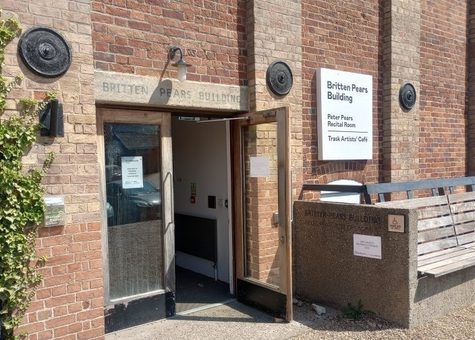
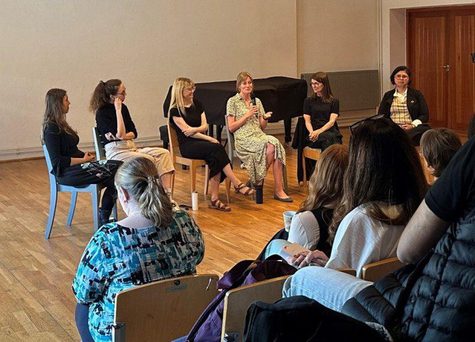
“I came to AHRI curious about how we can better align arts and health research with the kinds of evidence decision-makers rely on. The course helped me reframe those questions and introduced me to methodologies, frameworks, and case studies I hadn’t encountered before.” – Allison
“I was amazed by the range and depth of research studies that were showcased during the Intensive, with scientific evidence of the positive cognitive, physical, psychological/emotional and behavioural effects of engaging in the arts across a diverse range of participant target groups.” – Sasha
CONNECTING with professionals and students from around the world
Another key aim of the Research Intensive is to bring people with a shared interest together to exchange ideas and provide time and space to form lasting connections. Many delegates started getting to know each other in advance of the course. Then, on the first day alone, activities included: speed networking, a walking tour of the pioneering Snape Maltings site with Angie Lee-Foster from Britten Pears Arts, and a drinks reception with a stunning view.
It is the passion and expertise of delegates that makes the Research Intensive so impactful for everyone in attendance. Breaks, lunches, and evenings were filled with conversation. Some of our previous cohorts have stayed in touch for years and we are delighted to see how proactive class of 2025 have been already at building their own alumni network.

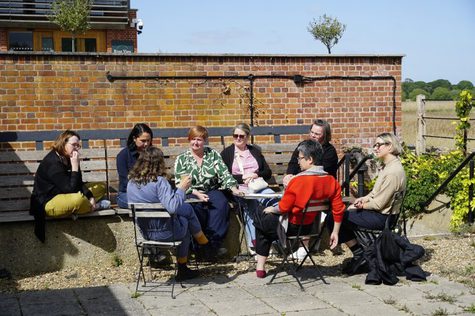
“It was such a rare and energizing experience to meet artists, researchers, and practitioners from around the world who are all wrestling with how to build rigorous, meaningful, and equitable work at the intersection of arts and health. I left feeling part of a generous and growing community.” – Allison
“The community of people from across all sections of the arts and health sector was without doubt amongst the most special things about the week long Intensive. Everybody was so warm, open and giving, which helped to create an invigorating atmosphere and inspiring experience. I’ve already invited and arranged for another delegate on the Intensive to visit my organisation [Raw Material Music & Media], to observe our work in action, and to discuss and share practice. And who knows…a future research collaboration may even come out of it!” – Sasha
APPLYING learnings to your own work
The last main component of the Research Intensive is application. Delegates are given the opportunity to use the tools, resources, and ideas offered to advance their own projects, with faculty on hand to help think through any questions. This included digging into logic models, implementation matrices, and study modelling, all working towards a project pitch. Thursday afternoon was nothing short of inspiring! Gathered around tables, in a lecture theatre, café, and outdoors, delegates gave presentations to each other and faculty, exchanging valuable feedback to further advance their work.
A final thread running through the entire course was the daily opening and closing creative sessions. This year, they were wonderfully facilitated by Dr Jenny Lee and Dr Nisha Sajnani. In these slots, delegates learned about creative facilitation through experience – they wondered, explored their origin stories through poetry, thought about colours, reflected through images, and danced.
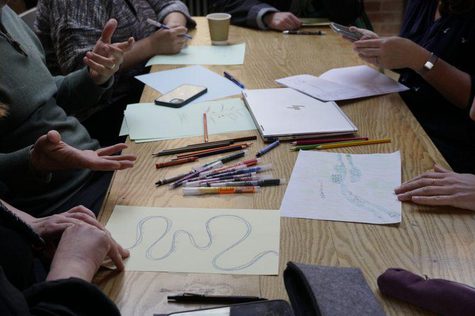
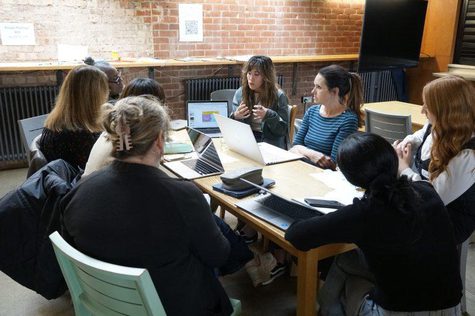
“As a Creative Health Programme Director in the community sector, I’m really keen to adopt more scientific research approaches in order to develop a deeper understanding of the positive effects of our work; as well as to increase the robustness of our programme evaluations, and the evidence base and legitimacy of our funded community arts programmes. I’m currently working alongside our Impact & Insight Officer on how we can proportionally introduce some of the research models explored during the Intensive into our own evaluation practice.” – Sasha
“The AHRI helped me shape the outline of a potential payer policy roundtable, bringing together stakeholders to discuss how arts and health research can become more relevant to reimbursement decisions, and vice-versa! It’s early-stage thinking, but the course gave me the momentum and confidence to explore it further.” – Allison
A huge thank you to everyone who made this nurturing week happen – the delegates, our partners, and the staff team!
The Research Intensive will take place again in June 2026 and you can now register your interestto be notified when applications open!
In the meantime, stay in touch by subscribing to the newsletter and following us on LinkedIn, Bluesky and X (formerly Twitter).